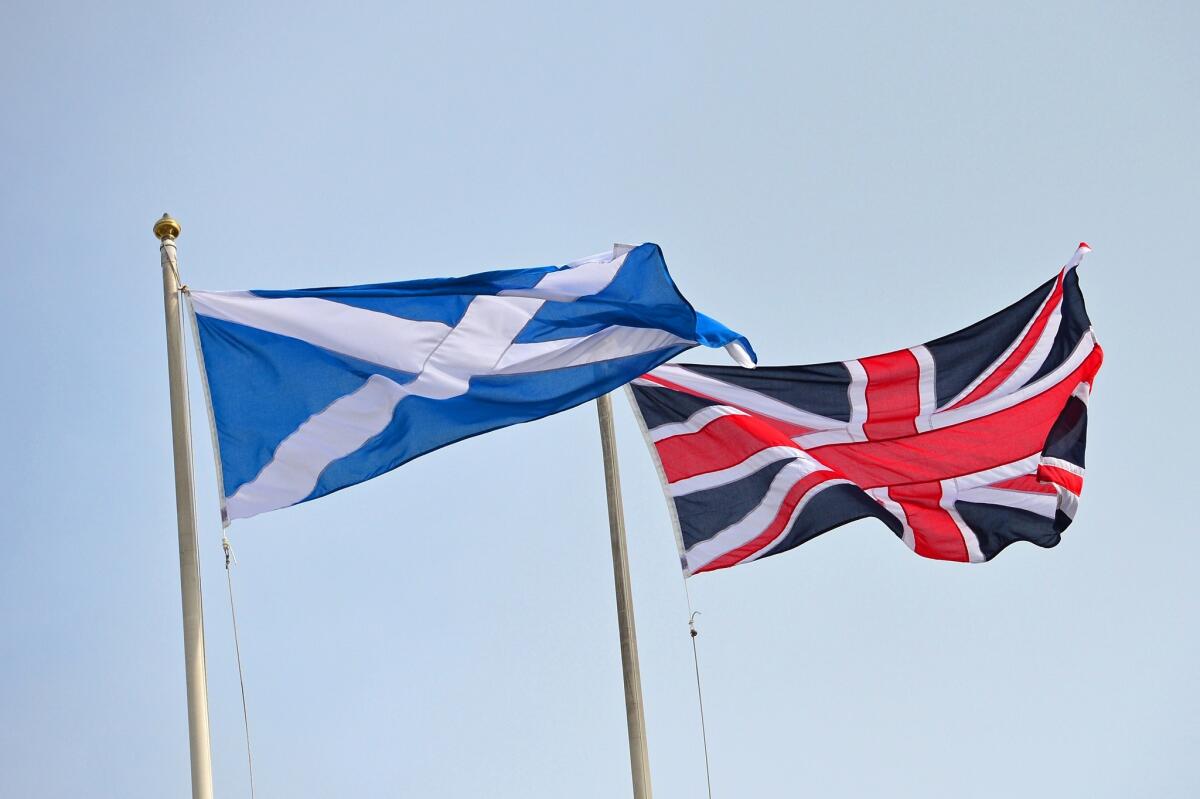Scottish independence: What is the referendum about?

- Share via
Voters in Scotland cast ballots Thursday in a historic referendum on seceding from Britain.
A “yes” vote would end Scotland’s 300-year-old union with England and Wales, redrawing the map of the United Kingdom and raising difficult questions about the future of Scotland’s economy and its relationship with international partners such as the European Union and NATO.
But even if the “noes” have it, Scotland appears poised to extract more powers from the central government in London. In a bid to persuade Scots to stay in the fold, Britain’s main political parties have pledged to turn over control of important tax and budgetary issues to the semiautonomous government in Edinburgh.
More than 4.2 million people – 97% of the eligible electorate, including for the first time 16- and 17-year-olds -- registered to vote. The referendum will be decided by a simple majority. Turnout is expected to be high, and polls show the outcome too close to call heading into the vote.
Here are some questions and answers about the referendum.
Why are Scots voting on independence?
Support for what was long regarded as the dream of a romantic fringe has been growing in recent years, receiving a boost in 2010 with the election of a Conservative-led government in London that did not prove popular in Scotland.
The following year, the Scottish Nationalist Party, whose main goal is independence, won a majority in the Scottish Parliament. Party leader Alex Salmond, Scotland’s first minister, immediately declared his intention to call a referendum on the issue.
With opinion polls giving the pro-union side a consistent majority, the British government agreed to recognize the plebiscite, no doubt hoping that a “no” vote would kill off the issue.
How likely is Scotland to secede from Britain?
Until last month, it looked like supporters of Scottish independence were headed to defeat at the ballot box. But the pro-union lead has narrowed considerably in opinion polls, prompting a last-minute scramble on both sides to win over undecided voters. Polls released Wednesday gave a slight edge to the “no” camp, but the outcome remained too close to call.
What would Scotland gain by breaking from Britain?
Scotland already runs its own health, education and legal systems, largely free of interference from London. But other governmental concerns -- such as employment, benefits, defense and the oil and gas industry -- are decided by the central government in London, where Scotland’s more liberal representatives tend to be eclipsed by a Conservative majority.
An independent Scotland would also gain control of oil and gas revenue which now goes to the British Treasury.
But for many supporters of Scottish independence, the vote is ultimately about national pride.
Why do many think independence is a bad idea?
Opponents of independence have emphasized the potential economic costs, warning that Scotland would not be allowed to continue using the British pound and that businesses would flee the uncertainty inherent with a newly formed country. Some also question the wisdom of hitching Scotland’s future to North Sea oil and gas production, which has been declining in recent years and will eventually run out.
Although Salmond’s party wants Scotland to remain in the EU, officials in Europe have said that would be extremely difficult to do as an independent country.
There have also been emotional pleas not to break up a union that has existed since 1707.
What happens next if Scotland votes yes?
A “yes” vote would begin months of negotiations between Scotland and the British government over the details of independence.
Among the thorny issues to be resolved are the division of the North Sea oil and gas revenue, Scotland’s share of the national debt and what currency it would use. There is also the question of Britain’s fleet of nuclear-armed submarines, which Scotland would want removed from its current base near Glasgow.
At the same time, Scotland would open negotiations with the European Union and other international partners.
Scottish authorities want these issues resolved in 18 months and say independence would take effect in March 2016.
And if Scotland votes no?
Britain’s three main political parties, the Conservatives, Labor and Liberal Democrats -- issued a joint declaration last month promising to transfer more powers to Edinburgh no matter which of them wins next year’s British national election. Those additional powers, including setting income tax rates and making more decisions on social spending, would give Scotland a greater degree of self-rule than at any time since it merged with England and Wales centuries ago.
For more international news, follow @alexzavis on Twitter
More to Read
Sign up for Essential California
The most important California stories and recommendations in your inbox every morning.
You may occasionally receive promotional content from the Los Angeles Times.











